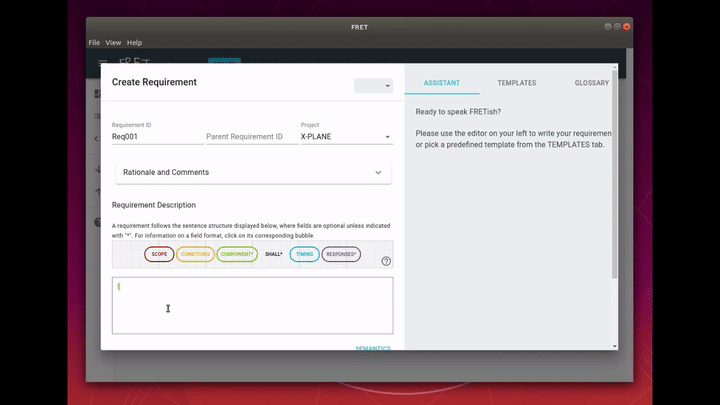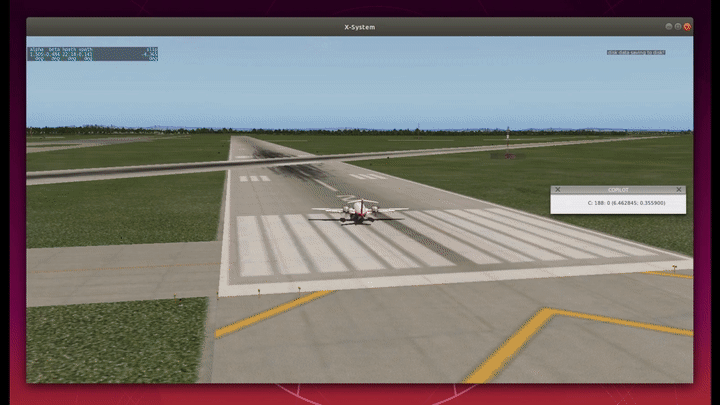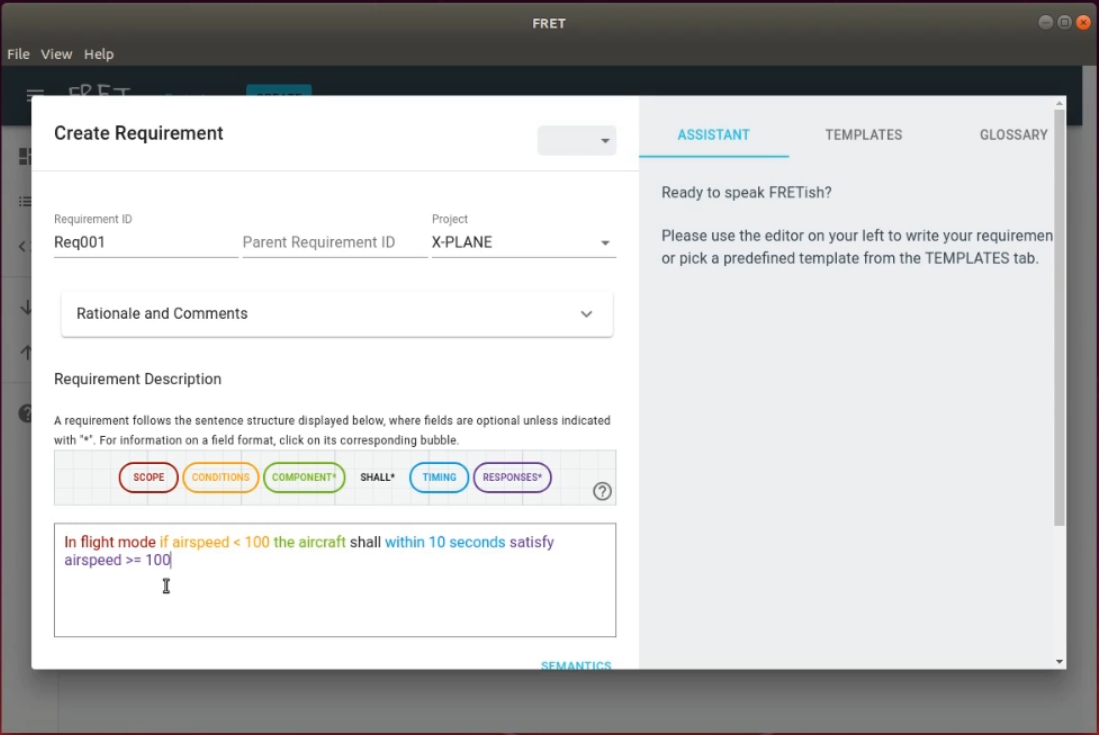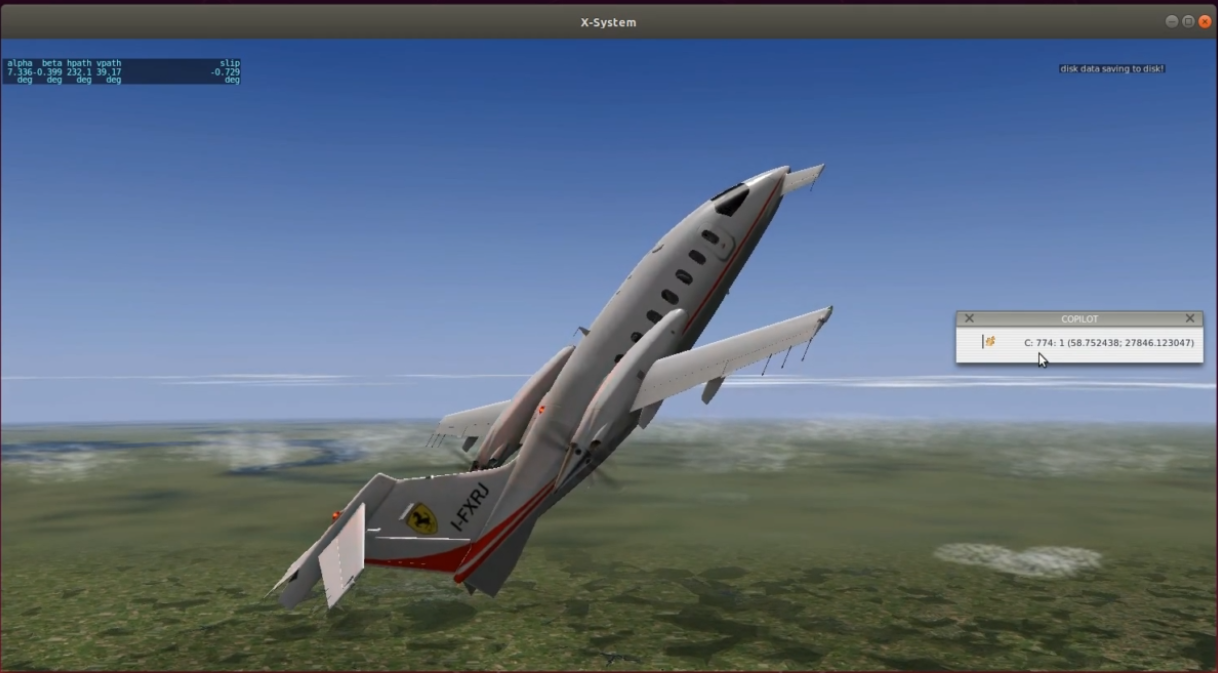Ogma is a tool to facilitate the integration of safe runtime monitors into other systems. Ogma extends Copilot, a high-level runtime verification framework that generates hard real-time C99 code.
-
Translating requirements defined in NASA's requirements elicitation tool FRET into corresponding monitors in Copilot.
-
Generating NASA Core Flight System applications that use Copilot for monitoring data received from the message bus.
-
Generating message handlers for NASA Core Flight System applications to make external data in structs available to a Copilot monitor.
-
Generating the glue code necessary to work with C structs in Copilot.
-
Generating Robot Operating System applications that use Copilot for monitoring data published in different topics.

Conversion of FRET requirements into C code.

Integration of monitors into larger applications (e.g., simulators).
To install Ogma from source, users must have the tools GHC and cabal-install. At this time, we recommend GHC 8.6 and a version of cabal-install between 2.4 and 3.2. (Ogma has been tested with GHC versions up to 9.2 and cabal-install versions up to 3.6, although the installation steps may vary slightly depending on the version of cabal-install being used.)
On Debian or Ubuntu Linux, both can be installed with:
$ apt-get install ghc cabal-installOn Mac, they can be installed with:
$ brew install ghc cabal-installOnce GHC and cabal are installed, the simplest way to install Ogma is with:
$ git clone https://github.com/nasa/ogma.git
$ cd ogma
$ export PATH="$HOME/.cabal/bin/:$PATH"
$ cabal v1-install alex happy
$ cabal v1-install BNFC copilot
$ cabal v1-install ogma-*/After that, the ogma executable will be placed in the directory
$HOME/.cabal/bin/, where $HOME represents your user's home directory.
The main invocation of ogma with --help lists sub-commands available:
$ ogma --help
ogma - an anything-to-Copilot application generator
Usage: ogma COMMAND
Generate complete or partial Copilot applications from multiple languages
Available options:
-h,--help Show this help text
Available commands:
structs Generate Copilot structs from C structs
handlers Generate message handlers from C structs
cfs Generate a complete cFS/Copilot application
fret-component-spec Generate a Copilot file from a FRET Component
Specification
fret-reqs-db Generate a Copilot file from a FRET Requirements
Database
ros Generate a ROS2 monitoring packageFRET is a requirements elicitation tool created by NASA Ames Research Center. Requirements can be specified in structured natural language called FRETish, and the tool helps users understand them, validate them, and formalize them. For instructions on how to specify, analyze and export FRET requirements, see the FRET manual.

Screenshot of requirement specified inside NASA's requirements elicitation tool FRET.
Ogma can convert specifications generated by FRET into Copilot monitors.
Specifically, the commands fret-component-spec and fret-reqs-db allow users
to interact with the different kinds of files produced by FRET.
FRET files include properties encoded using Temporal Logic, both in
SMV and in
CoCoSpec,
the latter of which is an extension of Lustre. Ogma uses the SMV expressions by
default, but the CLI flag --cocospec can be used to select the CoCoSpec
variant of requirements instead.
As an example, from the following FRET requirement:
test_component shall satisfy (input_signal <= 5)
Ogma generates the following Copilot specification:
import Copilot.Compile.C99
import Copilot.Language hiding (prop)
import Copilot.Language.Prelude
import Copilot.Library.LTL (next)
import Copilot.Library.MTL hiding (since, alwaysBeen, trigger)
import Copilot.Library.PTLTL (since, previous, alwaysBeen)
import Language.Copilot (reify)
import Prelude hiding ((&&), (||), (++), not, (<=), (>=), (<), (>))
input_signal :: Stream Double
input_signal = extern "input_signal" Nothing
-- | propTestCopilot_001
-- @
-- test_component shall satisfy (input_signal <= 5)
-- @
propTestCopilot_001 :: Stream Bool
propTestCopilot_001 = ( alwaysBeen (( ( ( input_signal <= 5 ) ) )) )
-- | Complete specification. Calls the C function void handler(); when
-- the property is violated.
spec :: Spec
spec = do
trigger "handlerpropTestCopilot_001" (not propTestCopilot_001) []
main :: IO ()
main = reify spec >>= compile "fret"This program can be compiled using Copilot to generate a fret.c file that
includes a hard real-time C99 implementation of the monitor. The specification
generated by FRET for the FRETish requirement shown above is included with the
Ogma distribution, and can be tested with:
$ ogma fret-component-spec --cocospec --fret-file-name examples/fret-reqs-small.json > FretCopilot.hs
$ runhaskell FretCopilot.hsThe first step executes ogma, generating a Copilot monitor in a file called
FretCopilot.hs. The second step executes the Copilot compiler, generating a C
implementation fret.c and C header file fret.h.
The resulting fret.c file can be tested with the main provided in
examples/fret-reqs-small-main.c, which defines a handler for Copilot to call
when the property monitored is violated, and a main function that steps through
the execution, providing new data for the Copilot monitor:
#include <stdio.h>
double input_signal; // Input data made available for the monitor
void step(void); // Copilot monitor's main entry point
void handlerpropTestCopilot_001(void) {
printf("Monitor condition violated\n");
}
int main (int argc, char** argv) {
int i = 0;
input_signal = 0;
for (i=0; i<10; i++) {
printf("Running step %d\n", i);
input_signal += 1;
step();
}
return 0;
}To compile both files, run gcc examples/fret-reqs-small-main.c fret.c -o main. Executing the resulting main shows that the condition is violated
after a number of steps:
Running step 0
Running step 1
Running step 2
Running step 3
Running step 4
Running step 5
Monitor condition violated
Running step 6
Monitor condition violated
Running step 7
Monitor condition violated
Running step 8
Monitor condition violated
Running step 9
Monitor condition violated
Take a peek inside the intermediate files FretCopilot.hs, fret.c and
fret.h to see what is being generated by Ogma and by Copilot.
The generated C code can be integrated as part of a larger application. For example, the following shows a Copilot monitor generated from a FRET file integrated in an X-Plane widget that presents information to users during a flight in the X-Plane simulator.

Screenshot of Copilot monitor generated by Ogma from FRET requirement,
integrated into the X-Plane flight simulator. The widget on the right side of
the screen presents information received and returned by the monitor, with a
red/fire icon to signal that the monitor has been triggered (i.e., that the
property has been violated).
Numeric Representations
FRET Component Specifications use the types real and int to represent
different numeric variables. Copilot distinguishes between different numeric
representations and supports multiple precisions, and so does the final C
code generated from the Copilot specification.
To help users generate code that works as part of a larger system without
modifications, Ogma includes two additional flags to map the types real and
int to specific Copilot (Haskell) types. For example, the following command
would generate a Copilot specification for a hypothetical
numeric-example.json FRET CS file while mapping all real variables to the
type Double and all integer variables to the type Int32:
$ ogma fret-component-spec --fret-file-name numeric-example.json --map-int-to Int32 --map-real-to Double
In the name of flexibility, Ogma does not sanitize the values of these
variables and copies the types passed to these options verbatim to the
generated Copilot code. It is the user's responsibility to ensure the types
passed are valid Haskell types within the scope of the module generated.
Note that Copilot supports only a limited subset of numeric types, which
must be instances of the type class
Typed.
NASA Core Flight System (cFS) is a flight software architecture to implement complex systems by combining multiple reusable applications that communicate to one another via a software bus. cFS has been used, among others, on spacecraft, cubesats, and drones.
Ogma includes multiple facilities to generate cFS applications. The cFS applications generated by Ogma perform three steps to connect Copilot monitors to the application:
- Subscribe to a message in the cFS communication bus.
- When a message of the desired kind arrives, copy the data to make it available to Copilot and call the monitor's main entry point.
- Declare handlers that are executed when the property being monitored is violated.
When using this facility, Ogma produces a Copilot file that the user is expected to modify to implement the property to monitor. To avoid having to modify the generated C files that implement the cFS app itself, Ogma gives the ability to state what information one is interested in monitoring. If the kind of information is known to Ogma, it will automatically subscribe to the necessary messages and make it available to Copilot. Ogma provides additional flags to customize the list of known variables, so that projects can maintain their own variable databases beyond what Ogma includes by default.
cFS applications are generated using the Ogma command cfs, which receives
three main arguments:
--app-target-dir DIR: location where the cFS application files must be stored.--variable-file FILENAME: a file containing a list of variables that must be made available to the monitor.--variable-db FILENAME: a file containing a database of known variables, and the message they are included with.
The following execution generates an initial cFS application for runtime monitoring using Copilot:
$ ogma cfs --variable-db examples/cfs-variable-db --variable-file examples/cfs-variables
The application generated by Ogma contains the following files:
copilot-cfs-demo/CMakeLists.txt
copilot-cfs-demo/fsw/for_build/Makefile
copilot-cfs-demo/fsw/mission_inc/copilot_cfs_perfids.h
copilot-cfs-demo/fsw/platform_inc/copilot_cfs_msgids.h
copilot-cfs-demo/fsw/src/copilot_cfs.c
copilot-cfs-demo/fsw/src/Properties.hs
copilot-cfs-demo/fsw/src/copilot_cfs_msg.h
copilot-cfs-demo/fsw/src/copilot_cfs_events.h
copilot-cfs-demo/fsw/src/copilot_cfs_version.h
copilot-cfs-demo/fsw/src/copilot_cfs.h
Users are expected to modify Properties.hs to adjust the property being
monitored. Although it is possible to adjust the file copilot_cfs.c to
include property violation handlers, we recommend adding them in a separate C
file and modifying the compilation scripts to include that additional file.
That way, invoking Ogma again will not overwrite the changes made to the cFS
application.
In this particular example, the C code generated contains the following
instruction to subscribe to an ICAROUS_POSITION_MID message to obtain
the vehicle position:
CFE_SB_Subscribe(ICAROUS_POSITION_MID, COPILOT_CommandPipe);The message dispatcher included in the application detects a message of this kind and calls a dedicated subroutine:
void COPILOT_ProcessCommandPacket(void)
{
CFE_SB_MsgId_t MsgId;
MsgId = CFE_SB_GetMsgId(COPILOTMsgPtr);
switch (MsgId)
{
case ICAROUS_POSITION_MID:
COPILOT_ProcessIcarousPosition();
break;
...Finally, the dedicated subroutine makes data available to the monitor
and calls the main Copilot entry point step:
void COPILOT_ProcessIcarousPosition(void)
{
position_t* msg;
msg = (position_t*) COPILOTMsgPtr;
position = *msg;
step();
}The Robot Operating System (ROS) is a framework to build robot applications.
Ogma is able to generate ROS monitoring applications that subscribe to obtain the data needed by the monitors and report any violations. At present, support for ROS app generation is considered preliminary.
ROS applications are generated using the Ogma command ros, which receives
five main arguments:
--app-target-dir DIR: location where the ROS application files must be stored.--fret-file-name FILENAME: a file containing a FRET component specification.--variable-file FILENAME: a file containing a list of variables that must be made available to the monitor.--variable-db FILENAME: a file containing a database of known variables, and the topic they are included with.--handlers FILENAME: a file containing a list of handlers used in the specification.
Not all arguments are mandatory. You should always provide either a FRET component specification, or both a variable file and a handlers file. If you provide a variables file or a handler file and a FRET component specification, the variables/handlers file will always take precedence, and the variables/requirements listed in the FRET component specification file will be ignored.
The following execution generates an initial ROS application for runtime monitoring using Copilot:
$ ogma ros --fret-file-name Export.json --variable-file variables --variable-db ros-variable-db --app-target-dir ros_demoThe application generated by Ogma contains the following files:
ros_demo/CMakeLists.txt
ros_demo/src/copilot_monitor.cpp
ros_demo/src/copilot_logger.cpp
ros_demo/src/.keep
ros_demo/package.xml
The user must place the code generated by Copilot monitors in two files,
ros_demo/src/monitor.h and ros_demo/src/monitor.c. No Copilot or C code for
the monitors is generated by default.
The code generated by default assumes that handlers receive no arguments. The user must modify the handlers accordingly if that is not the case.
Although the variable DB file is not mandatory, it is in practice required to monitor any requirement that uses any input data: no topic subscriptions will be generated for any variables for which a DB entry cannot be found. At present, Ogma will proceed without warnings if a variable is mentioned in a requirement or variables file but a matching entry is not found in the variable DB.
A lot of the information that must be monitored in real-world C applications is packed in structs. Copilot allows accessing specific fields of C structs, but requires additional definitions in the Copilot language to make the shape of those structs known to the compiler.
Ogma is able to generate the boilerplate code needed to work with C structs in Copilot. For example, to use the following struct as the type of an extern stream in Copilot, the user is expected to define several Copilot (Haskell) types and type class instances:
typedef struct {
double x;
double y;
} point;Ogma can generate that code automatically with the structs subcommand:
$ ogma structs --header-file-name examples/point.h
data Point = Point
{ pX :: Field "x" Double
, pY :: Field "y" Double
}
instance Struct Point where
typename _ = "point"
toValues v = [ Value Double (pX v), Value Double (pY v) ]
instance Typed Point where
typeOf = Struct (Point (Field 0) (Field 0))
By including these definitions in a Copilot file, users can now access the
individual x and y fields of a Point in a stream.
The best way to contribute to Ogma is to report any issues you find via the issue tracker, and to use Ogma to build applications or in your own research and let us know about your results.
We kindly ask users not to send PRs to this project. Instead, please document the bugs you find or other suggestions as issues and we will make the necessary changes.
Ogma has been created by Ivan Perez and Alwyn Goodloe.
The Ogma team would like to thank Dimitra Giannakopoulou, Anastasia Mavridou, and Thomas Pressburger, from the FRET Team at NASA Ames, for the continued input during the development of Ogma.
We would also like to thank Cesar Munoz and Swee Balachandran, for their help with the cFS backend.
X-Plane images obtained via the X-Plane 10 (Pro) flight simulator. Re-shared with permission.
Copyright 2020-2021 United States Government as represented by the Administrator of the National Aeronautics and Space Administration. All Rights Reserved.
See the file LICENSE.pdf for details.